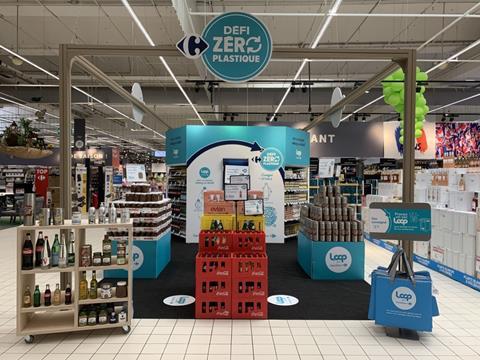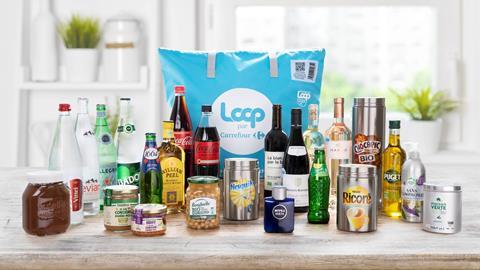Following pilots in markets including the U.S., Canada, the U.K., and Japan, TerraCycle’s reuse platform Loop has reached industrial scale in collaboration with Carrefour and a coalition of brands and retailers in France, with more than 370 products available across 345 supermarkets nationwide.

Leading French grocery chain Carrefour became the first retailer in the world to launch Loop in-store, following an initial e-commerce pilot initiated in 2019. Since then, the retailer has expanded to nearly 340 stores across France, introducing more than 50 of its own private-label products to the platform alongside over 370 products from national and global brands. Following Carrefour’s success, other leading retailers—including Monoprix and Coopérative U—have joined the platform, helping to drive a national movement toward reuse.
Today, French residents have access to a “fully functioning”, nationwide reuse system offering a wide assortment of everyday consumer product - from wine to shampoo to spreads - in reusable packaging available at their local supermarkets.
By pioneering this system, Loop and Carrefour created the operational conditions that made nationwide deployment possible - both in Carrefour and other participating retailers. This interoperable system allows consumers to buy products nationally in reusable packaging, pay a deposit, use them as usual, and return them without cleaning to any participating retailer. This milestone reportedly marks a significant turning point in the global transition from a linear to a circular economy.
“France has shown that reuse can work—not as a concept or a pilot, but at full commercial scale,” said Tom Szaky, Founder and CEO of TerraCycle and Loop. “What made this possible wasn’t consumer demand alone—but the alignment of regulation, funding, and supply chain convenience for all actors. It’s a functioning national system. As other countries face growing pressure to move beyond single-use packaging, the lesson is clear: if the conditions are right, reuse can become a mainstream way of doing business—not a fringe solution.”

Beyond integrating Loop in-store, the partnership mobilized an ecosystem of major brands—including Ferrero, Danone, Suntory, and Coca-Cola—to join the movement. In doing so, Carrefour and Loop catalyzed the creation of the “world’s largest” reuse coalition, bringing together national brands, private labels, and other retailers.
“Loop’s progress in France shows what’s possible when retailers, brands, policy makers, and solution providers move together,” said Christian Kaufholz, Head, Community Engagement and Impact, Global Plastic Action Partnership, World Economic Forum. “At the World Economic Forum’s 2019 Annual Meeting, we convened the Loop Alliance to catalyze this kind of cross-ecosystem collaboration—from product design and safety to logistics, data, and common metrics. France’s experience offers practical insights for scaling reuse models that are convenient for people and operationally viable for business.”
“Thanks to Loop, we’ve proven that it is possible to offer consumers everyday products in reusable packaging—without compromising convenience or the in-store experience. This achievement at industrial scale confirms that the right mix of bold regulation, logistical innovation, and collective commitment is the key to transforming our distribution model for the long term,” said Carine Kraus, Executive Director of Engagement and member of Carrefour’s Executive Committee.
After years of testing, iterations, and lessons learned, France has now emerged as a model for how reuse can function at industrial scale—providing a global blueprint for countries seeking to implement reuse systems that work for all consumer packaged goods.
Loop’s success in France stands in contrast to widespread deregulation and the rollback of voluntary corporate sustainability commitments in other markets. In France, the right mix of regulation, strong retailer leadership from commercial partners, financial incentives, and a focus on simplicity and convenience has proven that large-scale reuse is not only possible but also operationally sustainable.
“France has chosen to be a pioneer. With the AGEC law and the commitment of our businesses and regions, we have built one of the most advanced frameworks for reuse in the world. This isn’t just a national success; it’s a model that inspires, influences, and demonstrates that the transition to a circular economy is possible on a large scale,” said Véronique Louwagie, Minister Delegate for Trade, Crafts, Small and Medium Enterprises, and the Social and Solidarity Economy of France. “France will continue to act and commit, alongside all who share this ambition: to build a more sustainable, fairer, and more resilient economy. Because protecting our planet is protecting our common future.”
In other recent reuseable packaging news, Vytal has announced it has acquired Bumerang in hopes of expanding digital reuse across foodservice and events venues in Spain, as well as helping more organizations align with incoming PPWR mandates.
Elsewhere, Reusables.com’s RFID-enabled, zero-deposit reuse system supplies reusable foodservice containers and smart return bins to university campuses, offices, hospitals, and other institutions in hopes of reducing single-use waste and streamlining operational costs.














No comments yet